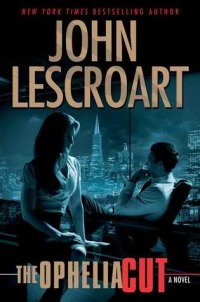The Ophelia Cut by John Lescroart
 Wednesday, May 8, 2013 at 12:44PM
Wednesday, May 8, 2013 at 12:44PM 
Published by Atria Books on May 7, 2013
Anthony Ricci, NYPD police sergeant and part-time hit man, enters a witness protection program to avoid swimming with the fishes. Now known as Tony Solaia, he finds himself swimming with Dismas Hardy in the chilly waters of San Francisco's bay. Soon after that, Hardy is representing Solaia, now working as a bartender, on a charge of selling alcohol to minors. The raid of the bar in which Solaia was working has been orchestrated by a politician, in concert with the owner of several massage parlors, as part of a Machiavellian scheme to achieve their mutual goals.
Solaia is the connecting thread in a story that weaves together a number of characters, many of whom will be familiar to fans of the series. Other than Hardy, the most significant to the plot are Hardy's brother-in-law, Moses McGuire, and Moses' daughter, Brittany McGuire, a beautiful young butterfly who briefly alights on Goodman's arrogant chief of staff, Rick Jessup, before landing on Solaia. Jessup's political machinations and history of violence give birth to the novel's primary storyline, culminating in a murder that provides Hardy with another case to defend. The plot turns into a whodunit, as neither Hardy nor the reader know who committed the murder. In addition to Hardy's client, there are a number of possible candidates from whom to choose. To his credit, John Lescroart kept me guessing until the novel's end.
As is common in series fiction, much of the story focuses on the interaction of established characters, their relationships and conflicts. The character of Brittany is drawn with particular sensitivity. The courtroom drama that is the hallmark of legal thrillers is absent in the first half of the novel, as Lescroart sets up the story and develops his characters. The leisurely pace of the novel's opening half might not appeal to some readers, but I appreciated the time Lescroart took to fine-tune the friendships and divided loyalties that are so integral to the plot. Once the story gets moving (about the time the trial starts), it moves swiftly.
Lescroart has a good handle on the games played by police, prosecutors, and judges to protect their own turfs. He also has a jaded (i.e., realistic) understanding of the political motivations that underlie high profile arrests, followed by futile prosecutions, of low-impact crimes like underage drinking. At the same time, he doesn't use the novel as a soapbox -- his characters express their opinions within the context of the story. Like all good legal thrillers, the novel is full of "Inside Baseball" lore about the art and pitfalls of criminal trials, from greedy expert witnesses to the perils of eyewitness identification, the burdensome hurdles the defense must overcome before it can argue that some other person committed the charged murder, and the ever-tricky problem of how a defense lawyer deals with the suspicion that a client, or some other defense witness, is telling a lie. Both Hardy and the prosecutor engage in the kind of theatrics that, if they happened more often in real life, would make trials a whole lot more fun to watch ... but those theatrics make the story fun to read.
Some aspects of the story stretch credibility, but never beyond its breaking point, and certainly no more so than is common in modern thrillers. The ending is a shocker, in a way that is perhaps a bit too karmic. It might make some fans of the series unhappy, but it reflects the reality that actions often have unexpected consequences, karmic or otherwise. Besides, by the fourteenth novel in a series, it's probably time to shake things up. In the end, and in addition to the ending, there are enough small but nifty twists in the story to make The Ophelia Cut thoroughly absorbing.
RECOMMENDED